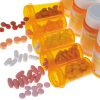- Empty cart.
- Continue Shopping
How to Keep Track of Multiple Medications

Managing multiple medications can be a challenging task, especially when you have various prescriptions, supplements, or over-the-counter drugs to take regularly. Keeping track of them is crucial to ensure you’re taking the right doses at the right times, avoiding potential interactions, and optimizing your health.
1. Create a Medication List
Start by compiling a comprehensive list of all the medications you’re taking. Include the following information for each medication:
- Medication Name: The name of the drug.
- Dosage: The prescribed dose, such as milligrams or units.
- Frequency: How often you should take it (e.g., once a day, every 8 hours).
- Reason: The medical condition or purpose for which you are taking the medication.
- Prescribing Healthcare Provider: The name and contact information of the doctor who prescribed it.
- Pharmacy Information: The pharmacy where you fill the prescription.
You can create this list on paper or use digital tools like medication management apps to keep it organized and easily accessible.
2. Organize Medications Properly
Keep your medications organized to prevent mix-ups and ensure you’re taking the correct doses. Here’s how:
- Pill Organizer: Invest in a weekly or monthly pill organizer with compartments for each day and time. Fill it in advance to avoid confusion.
- Separate Containers: If you prefer not to use a pill organizer, keep each medication in a separate container or blister pack to avoid mixing them up.
- Use Labels: Label your medications with their names and dosage information for quick identification.
3. Set Alarms and Reminders
Technology can be a powerful ally in medication management. Use your smartphone or other devices to set alarms and reminders for each dose. Most smartphones have built-in apps for this purpose, or you can download specialized medication reminder apps. Be sure to label each alarm with the medication name and time to take it.
4. Sync Medication Schedules
Whenever possible, work with your healthcare providers to synchronize your medication schedules. This can reduce the complexity of your regimen by allowing you to take multiple medications at the same time. However, always consult your healthcare provider before making any changes to your medication schedule.
5. Educate Yourself
Understand each of your medications, including their purpose, potential side effects, and how they should be taken. Ask your healthcare provider or pharmacist any questions you may have. Being informed empowers you to take your medications correctly and recognize any issues that may arise.
6. Regular Medication Reviews
Schedule regular medication reviews with your healthcare provider. During these appointments, discuss your current medications, any new symptoms or side effects, and whether any medications can be adjusted or discontinued. Medication regimens can change over time, so it’s essential to keep your healthcare provider updated.
7. Pharmacy Consultations
Your pharmacist can be a valuable resource for medication management. They can help clarify any doubts you have about your medications, provide advice on taking them, and even offer medication synchronization services. Don’t hesitate to ask for their guidance.
8. Keep a Medication Journal
Consider maintaining a medication journal where you record each dose as you take it. Include the date, time, and any notes about how you felt or any side effects you experienced. This journal can serve as a helpful reference and a way to track your medication adherence.
9. Medication Management Apps
There are numerous medication management apps available for smartphones that can help you keep track of your medications. These apps allow you to input your medication list, set up reminders, and log when you take each dose. Some apps also provide drug interaction information and can generate reports to share with your healthcare provider.
10. Emergency Information
In case of an emergency, ensure that someone close to you, such as a family member or a trusted friend, knows about your medications and where to find your medication list. Additionally, consider wearing a medical alert bracelet or necklace that lists your essential medications and any allergies.
11. Travel Planning
If you’re traveling, plan ahead to ensure you have enough medication for the duration of your trip. Pack extra medication in case of unexpected delays. Keep your medications in their original containers with clear labels to avoid potential issues with airport security.
In Conclusion, Managing multiple medications doesn’t have to be overwhelming. By creating a medication list, staying organized, setting alarms and reminders, and seeking guidance from healthcare professionals, you can effectively keep track of your medications. Education, communication with your healthcare team, and the use of technology can all contribute to a safer and more manageable medication regimen. Remember that your health is a priority, and taking your medications as prescribed is a vital step toward maintaining it.








